Dr. Alexander Robel, Associate Professor
Email – Github – Bluesky – CV
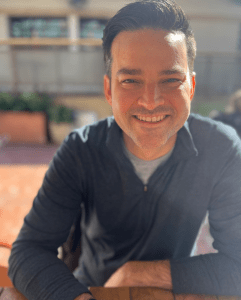 I was born and raised in Miami, Florida in a Argentinian/Bolivian-American family. An early fascination with the puzzles within nature led me to a science-oriented public high school where I got my first taste of research in an after school internship at a federal lab. As an undergraduate at Duke University, I studied Earth Sciences and Physics. I went on to pursue a PhD in Earth and Planetary Sciences at Harvard, where I was advised by Eli Tziperman and (externally) Christian Schoof. My dissertation focused on the theory and modeling of changes in ice stream flow and their connection to past periods of rapid deglaciation. I then worked with Victor Tsai at Caltech as a NOAA Climate and Global Change Postdoctoral Fellow. Since 2018, I have been a faculty member in the School of Earth and Atmospheric Sciences at Georgia Tech as the head of the Ice & Climate research group. Our work is focused on understanding the causes of ice sheet change and developing conceptual, mathematical, and computational tools to predict future changes.
I was born and raised in Miami, Florida in a Argentinian/Bolivian-American family. An early fascination with the puzzles within nature led me to a science-oriented public high school where I got my first taste of research in an after school internship at a federal lab. As an undergraduate at Duke University, I studied Earth Sciences and Physics. I went on to pursue a PhD in Earth and Planetary Sciences at Harvard, where I was advised by Eli Tziperman and (externally) Christian Schoof. My dissertation focused on the theory and modeling of changes in ice stream flow and their connection to past periods of rapid deglaciation. I then worked with Victor Tsai at Caltech as a NOAA Climate and Global Change Postdoctoral Fellow. Since 2018, I have been a faculty member in the School of Earth and Atmospheric Sciences at Georgia Tech as the head of the Ice & Climate research group. Our work is focused on understanding the causes of ice sheet change and developing conceptual, mathematical, and computational tools to predict future changes.
Postdoctoral Fellows
Brian Kyanjo
Email – Github
 I was born and raised in Kampala, Uganda—often referred to as the Pearl of Africa. My upbringing in a factory environment ignited my passion for physics and mathematics, as I was constantly exposed to machinery repairs, configurations, and installations. These daily experiences nurtured my love for science, leading me to pursue a combination of physics and mathematics in higher secondary school. This passion further guided me to major in physics, with a minor in mathematics, at Makerere University, Uganda and then a Master’s degree in Mathematical Sciences at the African Institute for Mathematical Sciences (AIMS) in Rwanda, where I specialized in Climate Science. At AIMS, I was introduced to scientific software development and computational modeling, which I quickly became passionate about, as it allowed me to model real-world scenarios. This passion for research, particularly in solving natural hazards, drove me to pursue a Ph.D. in Computing at Boise State University (BSU), specializing in Computational Math Science and Engineering, where my dissertation focused on a standalone computational model for overland flooding called GeoFlood, and accelerating scientific workflows with GPUs. Currently, I am a postdoctoral fellow at Georgia Tech, working under Professor Alexander Robel to develop a state-of-the-art data assimilation package and a Python wrapper for ice-sheet models.
I was born and raised in Kampala, Uganda—often referred to as the Pearl of Africa. My upbringing in a factory environment ignited my passion for physics and mathematics, as I was constantly exposed to machinery repairs, configurations, and installations. These daily experiences nurtured my love for science, leading me to pursue a combination of physics and mathematics in higher secondary school. This passion further guided me to major in physics, with a minor in mathematics, at Makerere University, Uganda and then a Master’s degree in Mathematical Sciences at the African Institute for Mathematical Sciences (AIMS) in Rwanda, where I specialized in Climate Science. At AIMS, I was introduced to scientific software development and computational modeling, which I quickly became passionate about, as it allowed me to model real-world scenarios. This passion for research, particularly in solving natural hazards, drove me to pursue a Ph.D. in Computing at Boise State University (BSU), specializing in Computational Math Science and Engineering, where my dissertation focused on a standalone computational model for overland flooding called GeoFlood, and accelerating scientific workflows with GPUs. Currently, I am a postdoctoral fellow at Georgia Tech, working under Professor Alexander Robel to develop a state-of-the-art data assimilation package and a Python wrapper for ice-sheet models.
Paul Summers – Joint w/Rutgers University
Email – Website
 I was born and raised in California, and discovered my passion for exploring and understanding the natural world when I was young through hiking day trips, backpacking at summer camp, and through scouting. In high school, I was drawn to math and physics and how these subjects could be used to explain the dynamics of the world around me. In undergrad at Stanford, I continued my journey with a BS in Physics while also applying this physics tool set to the natural world, earning an MS in Geophysics focusing on volcanic tremor. After taking 4 years to work as a software engineer after undergrad, I returned to Stanford for a PhD with Jenny Suckale focusing on modeling the dynamics of Antarctic ice streams and shear margins and integrating available field data into these models. At Georgia Tech I am focusing on modeling Ocean/Glacier/Melangé processes with specific applications to Greenlandic fjords. This work is in collaboration with Becca Jackson at Rutgers University. Beyond research, I am passionate about educating the next generation of researchers and reducing barriers to the geosciences by focusing on making education and field experiences accessible to students of all backgrounds and experience levels.
I was born and raised in California, and discovered my passion for exploring and understanding the natural world when I was young through hiking day trips, backpacking at summer camp, and through scouting. In high school, I was drawn to math and physics and how these subjects could be used to explain the dynamics of the world around me. In undergrad at Stanford, I continued my journey with a BS in Physics while also applying this physics tool set to the natural world, earning an MS in Geophysics focusing on volcanic tremor. After taking 4 years to work as a software engineer after undergrad, I returned to Stanford for a PhD with Jenny Suckale focusing on modeling the dynamics of Antarctic ice streams and shear margins and integrating available field data into these models. At Georgia Tech I am focusing on modeling Ocean/Glacier/Melangé processes with specific applications to Greenlandic fjords. This work is in collaboration with Becca Jackson at Rutgers University. Beyond research, I am passionate about educating the next generation of researchers and reducing barriers to the geosciences by focusing on making education and field experiences accessible to students of all backgrounds and experience levels.
Graduate Students
Ziad Rashed – Ocean Sciences and Engineering PhD
ARCS Global Fellow – Email
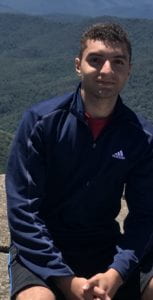
A native of Egypt, I moved to Northern Virginia in mid-2005 when I was 8 years old. I developed a deep interest in mathematics towards the end of my senior year of high school and was curious about how we can use its power and elegance to describe and model our world. This led me to pursue a degree in Engineering Science and Mechanics at Virginia Tech, where I studied and investigated the governing laws of materials and motions, and how they could be applied in different engineering disciplines. My undergraduate research focused on interfacial fluid mechanics and employing biomimicry for fabrication of slippery surfaces and passive energy generation. I am also very interested in using tools from nonlinear/chaotic dynamics and numerical modeling to determine how we can reduce the complexity of real-world systems while describing their response to internal and external changes. I am developing my skills in these subject areas to gain a greater understanding of the elaborate interactions between glacier and ocean systems, with the greater goal of understanding how these interactions affect the climate on a global scale.
Danielle Grau – Earth and Atmospheric Sciences PhD
GT UCEM Fellow – Email
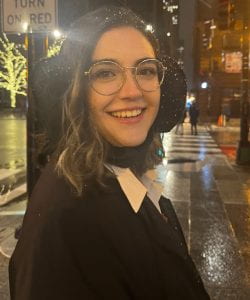
I was born and raised in Miami, Florida, where from a young age I had an interest in science, specifically in Earth and Space sciences. I studied Physics as an undergraduate at Florida International University, wanting to understand the processes and mechanics that dictate the behavior of the world around us. I came to glaciology as an REU researcher in the GT Ice & Climate Group to develop a theory for the statistical distribution of melt ponds observed on Antarctica’s ice shelves. In Fall 2021, I began as a PhD student in Earth & Atmospheric Sciences at Georgia Tech, where I will continue to study the effects of climate change on surface melt on ice sheets through mathematical models and high-performance computational methods.
Aminat Ambelorun – Earth and Atmospheric Sciences PhD
BBISS Graduate Fellow – Email
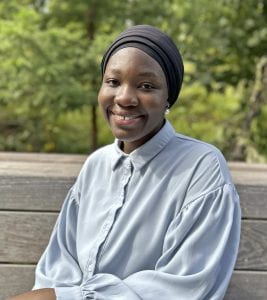
I was born and raised in Nigeria, the most populous country in Africa. My favorite courses from high school were maths and physics. As an undergraduate, I studied Physics at the University of Ibadan, Nigeria. My interest in applying physics and math to the study of earth system processes led me to pursue a postgraduate diploma in Earth System Physics at the International Centre for Theoretical Physics (ICTP), Italy. My research focused on investigating the interactions between the loss of Arctic sea ice and atmospheric circulation anomalies. I was introduced to glaciology at ICTP, and I am interested in using mathematical and computational tools to understand how ice sheets respond to changes in the environment and vice versa. In Fall 2021, I started as a PhD student in the Ice & Climate Group at Georgia Tech. I am currently investigating how the stochasticity of iceberg calving affects our ability to make well-constrained predictions of future ice sheet change.
Shivaprakash Muruganandham – Ocean Sciences and Engineering PhD
Email
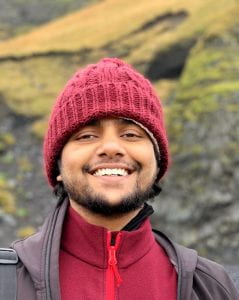
I grew up in Bangalore, in the southern part of India. Math and physics were fascinating to me from an early age, especially in the ways they addressed questions and problems in the natural world. I went down the engineering route for a few years, through undergraduate studies in Mechanical Engineering and master’s degrees in Cybernetics and Space Technology. During this time, I was introduced to the mathematical foundations of nonlinear dynamics, systems/control theory and machine learning, where I explored their applications across disciplines. Stemming from an interest in earth observation (EO) and advised by Michal Reinštein, my thesis detailed the development of artificial neural networks to interpret urban growth from satellite imagery. I then dove further into the EO and geospatial industry, where I consulted on strategic business problems related to satellite and space applications, particularly in the fields of climate, conservation, and development. Following these interests, I joined the Ice & Climate research group in 2021 to study oceanography and climate science, with a specific focus on fundamental problems in ice sheet and glacier dynamics, and how they relate to global-scale climate and sea level projections in the future.
Madeline Mamer – Earth and Atmospheric Sciences PhD
Email

Born and raised in the desert of southern California, I never thought about glaciers or ice sheets in a meaningful way until undergrad. At the University of Washington, I studied Earth and Space sciences and was introduced to glaciology and climatology. The influence ice and ice clathrates have on planetary climate systems fascinate me because they are removed from the general public’s perspective. Understanding how ice on Earth is changing is crucial to predicting sea-level rise as well as contributing to the growing body of science on icy satellites. This passion for ice systems combined with an REU experience at the University of Rhode Island Graduate School of Oceanography led me to my current research interest investigating the dynamics of the ice-ocean boundary. During the Fall 2021 semester I began as a PhD student at Georgia Tech in oceanography and climate sciences to explore the zone where the ocean meets glaciers.
Juleanna de la Cruz – Earth and Atmospheric Sciences PhD
GT Presidential Fellow – Email

I completed my undergraduate degree in Environmental Science with a minor concentration in Atmospheric & Oceanic Sciences at UCLA. In 2024, I joined the GT Ice & Climate Group as a PhD student. My research focuses on the incorporation of ensemble-based data assimilation methods using paleo and contemporary observations into ice sheet models. I am motivated by the intrinsic relevance of glaciology to the broader impacts of climate change and hope that my work may contribute to refining projections of sea level rise and informing climate resilience.
Undergraduate Students
Ayushi Rajpoot – GT Computer Science BS (Anticipated 2025)
 I was born in India, and spent earlier parts of my childhood in San Diego, California before moving to Georgia for high school. It really wasn’t until the later half of my high school education that I found my passion for computer science and interests in environmental science and climate change. Coming into college as a Computer Science major at Georgia Tech, I started on this incredible journey as an undergrad researcher in glaciology, where I have been utilizing community detection algorithms to analyze how glacier catchments may be influencing one another over time. I had never thought I would find myself working on glaciology, but I am constantly amazed and challenged on the team.
I was born in India, and spent earlier parts of my childhood in San Diego, California before moving to Georgia for high school. It really wasn’t until the later half of my high school education that I found my passion for computer science and interests in environmental science and climate change. Coming into college as a Computer Science major at Georgia Tech, I started on this incredible journey as an undergrad researcher in glaciology, where I have been utilizing community detection algorithms to analyze how glacier catchments may be influencing one another over time. I had never thought I would find myself working on glaciology, but I am constantly amazed and challenged on the team.
Grant Holly – GT Earth & Atmospheric Sciences BS (Anticipated 2026)
I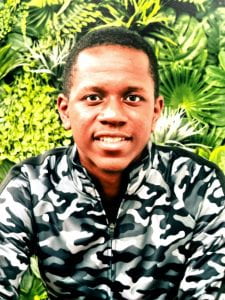 was born and raised in southern New Jersey, where from a young age I had an interest in science and mathematics. For most of my childhood, I thought I wanted to be a chemical engineer, but it wasn’t until the end of high school that I realized my passion for Earth and Planetary sciences. After coming to Georgia Tech to pursue a degree in Earth and Atmospheric Sciences, I found myself joining the GT Ice & Climate Group as an undergrad. My current research focuses on applying statistical methods to analyze surface mass balances of Greenland ice sheets over time.
was born and raised in southern New Jersey, where from a young age I had an interest in science and mathematics. For most of my childhood, I thought I wanted to be a chemical engineer, but it wasn’t until the end of high school that I realized my passion for Earth and Planetary sciences. After coming to Georgia Tech to pursue a degree in Earth and Atmospheric Sciences, I found myself joining the GT Ice & Climate Group as an undergrad. My current research focuses on applying statistical methods to analyze surface mass balances of Greenland ice sheets over time.
Former Members and Visitors
Postdoctoral Fellows:
Dr. Meghana Ranganathan (2022-2024) – Now an Assistant Professor at the University of Chicago, Chicago, IL, USA in the Department of Geophysical Sciences
Dr. Vincent Verjans (2021-2023) – Now a Scientist at the Barcelona Supercomputing Center in Barcelona, ESP
Dr. John Erich Christian (2020-2023) – Now an Assistant Professor at the University of Oregon, OR, USA in the Department of Geography
Dr. Elizabeth Ultee (2021) – Now an Assistant Professor at Middlebury College, VT, USA in the Department of Geology
Dr. Samantha Buzzard (2019-2020) – Now an Assistant Professor at Northumbria University, UK in the School of Geography and Environmental Sciences
Undergraduates:
Alma Diaz – REU (2024) – Valdosta State University, BS Environmental Science, Anticipated 2025
Kennidy Troupe – REU (2024) – Spelman College, Dual Degree Engineering, Anticipated 2027
Rohaiz Haris – GT UG Research (2021-2024) – GT BS ME 2024 – Now PhD student in glaciology at the Colorado School of Mines
Ella Stewart – GT UG Researcher (2021-2024) – GT BS/MS EAS 2023 – Now at NextEra Analytics
Jaela Allen – REU (2023) – Miami University of Ohio, BS Geology, Minor Mathematics, Anticipated 2025
Grace Hansen – GT UG Researcher (2022) – GT BS Comp. Sci. 2022 – Now at PricewaterhouseCoopers
Mikayla Pascual – REU (2021) – Middlebury BS Geology 2022 – Now PhD student at the University of Texas, Institute of Geophysics
Logan Mann – GT UG Researcher (2020-2021) – GT BS EAS 2020 – Now PhD student and NSF GRFP Fellow in glaciology at Dartmouth College
Hannah Verboncoeur – GT UG Researcher (2019-2021) – GT BS EAS 2021 – Now PhD student and NSF GRFP Fellow in glaciology at the Colorado School of Mines
Adriana Formby-Fernandez – REU + Technician (2019-2021) – ERAU BS Eng. Physics 2021 – MS UCSD 2023 – Now at Riverside Technology
Blake Castleman – GT UG Researcher (2019-2020) – GT BSE Mech. Eng. 2022 – MS CS Columbia Uni – Now at Bloomberg
Austin Matthews – GT UG Lab Engineer (2019) – GT BSE/MS Mech. Eng. 2019/2021 – Now at Ursa Major Technologies